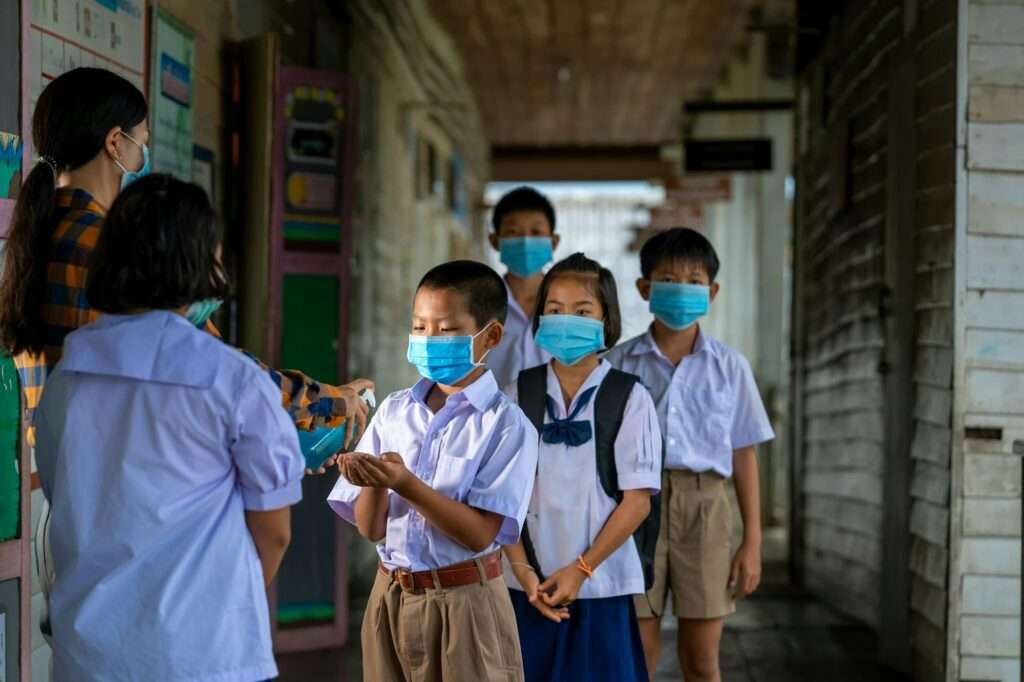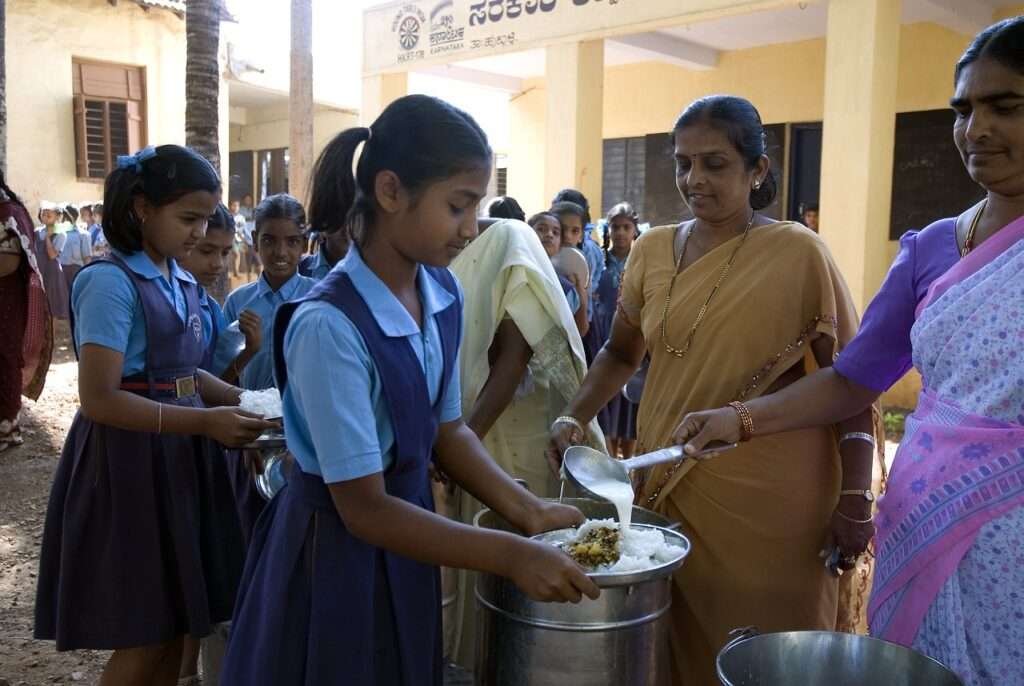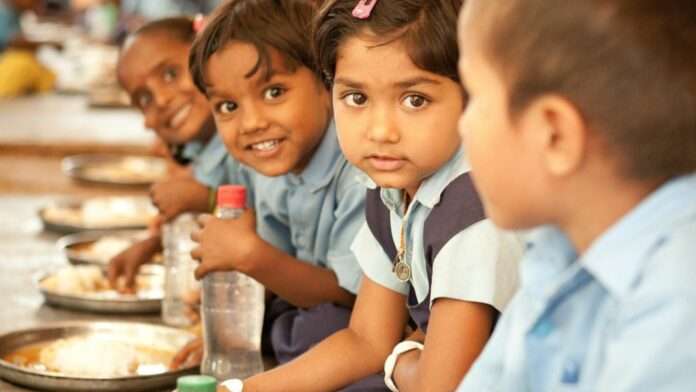In India, the Mid Day Meals (MDM) scheme stands as a cornerstone in ensuring the nutritional welfare of school-going children, particularly from disadvantaged backgrounds. Originally introduced to bolster the nutritional status of children and enhance the efficacy of primary education, the scheme has undergone significant transformations over the years. This article delves into the evolution, current status, challenges, and future prospects of the MDM scheme.
The inception of the Mid Day Meal Scheme can be traced back to pre-independent India, with its roots entrenched in the Union Territory of Puducherry during the French administration era in the 1930s. However, its widespread adoption took shape post-independence, notably pioneered by former Chief Minister K. Kamaraj in Tamil Nadu during the early 1960s.
By the turn of the millennium, propelled by a Supreme Court mandate, the scheme expanded its reach across all states of India, becoming a pivotal intervention in bolstering child nutrition and primary education.
Table of Contents
Evolution of the Mid Day Meals (MDM) Scheme
In September 2021, the Ministry of Education (MoE) rechristened the scheme as PM-POSHAN (Pradhan Mantri Poshan Shakti Nirman) Scheme. This renaming reflects a broader commitment towards fostering nutritional empowerment among school children.
Acknowledging the imperative of inclusivity, the central government announced plans to integrate an additional 24 lakh students enrolled in pre-primary education into the scheme by 2022. This expansion underscores a concerted effort to address the nutritional needs of a broader demographic.
Legal Framework and Obligations
India, as a signatory to the Convention on the Rights of the Child, has committed to providing “adequate nutritious food” to children, as enshrined under Article 24. This underscores the legal and moral obligations of the state towards ensuring the nutritional well-being of its young populace.
The Mid Day Meal Scheme finds statutory support under the National Food Security Act, 2013, thereby fortifying its legal framework and ensuring its sustainability as a pivotal intervention in child welfare.
Initiatives by the Central Government

National Programme of Nutritional Support to Primary Education (NP-NSPE)
Initiated on 15th August 1995, NP-NSPE aimed to enhance the nutritional status of primary school children, thereby augmenting the effectiveness of primary education. Over the years, this program has evolved into a comprehensive intervention catering to the diverse nutritional needs of school-going children.
Supreme Court Mandate
The landmark Supreme Court order dated 28th November 2001, in response to the Public Interest Litigation (Civil) No. 196/2001 filed by the People’s Union for Civil Liberties (PUCL), mandated all government and government-assisted primary schools to provide cooked midday meals. This judicial intervention underscored the intrinsic link between the right to food and the right to life, as enshrined in the Indian Constitution.
Entitlements under the Mid Day Meal Scheme
The Mid Day Meal (MDM) scheme, aimed at enhancing the nutritional status of school children, comes with specific entitlements regarding the quantity and quality of food provided. These entitlements ensure that each child receives a balanced and nutritious meal, thereby supporting their overall growth and development.
Nutritional Guidelines
The scheme adheres to stringent nutritional guidelines, outlining the minimum amount of food and calorie content per child per day based on their grade level:
| Item | Primary (class one to five) | Upper primary (class six to eight) |
|---|---|---|
| Calories | 450 | 700 |
| Protein (in grams) | 12 | 20 |
| Rice / wheat (in grams) | 100 | 150 |
| Dal (in grams) | 20 | 30 |
| Vegetables (in grams) | 50 | 75 |
| Oil and fat (in grams) | 5 | 7.5 |
In addition to the aforementioned food items, the scheme also encompasses provisions for micronutrients such as vitamin A, iron, and folate. Students are entitled to receive the specified amount of these micronutrients, as provided for in the school health programme of the National Rural Health Mission.
Also read – Legumes: A Nutrient-Rich Solution to Malnutrition in Tribal Tracts
Financing the Midday Meal Scheme
The Midday Meal Scheme, a flagship program aimed at enhancing the nutritional intake of school children, operates through a collaborative financing model between the central and state governments. The financial arrangement delineates the respective contributions of each entity and outlines the allocation of funds for various components of the scheme.
Cost Sharing Mechanism
The financial burden of implementing the Midday Meal Scheme is shared between the central and state governments, with the former contributing 60 percent and the latter 40 percent of the total cost. While the central government provides grains and financing for other food items, expenses related to facilities, transportation, and labor are jointly borne by both levels of government.
Differential Contributions
The participating states and territories exhibit variance in their financial contributions, contingent upon their geographic classification. Himalayan states, Northeastern Region (NER) states, union territories without legislature, and residual regions (Non-NER states and union territories with legislature) contribute differing amounts, reflecting the unique socio-economic landscapes of each region.
Public Expenditure Trends
Over the years, public expenditure towards the Midday Meal Programme has witnessed a notable escalation, indicative of the scheme’s expanding scope and reach. From ₹73.24 billion (US$920 million) in 2007–08, the expenditure surged to ₹132.15 billion (US$1.7 billion) by 2013–14. In the fiscal year 2020–21, the budget allocation for the Midday Meal Scheme constituted 11% of the total budget allocated to the Ministry of Education, underscoring its significance as a critical intervention in the education sector.
Cooking Costs
The per-day cooking cost per child serves as a crucial metric in gauging the financial implications of the scheme. At the primary level, the cooking cost per child is fixed at ₹4.13 (5.2¢ US), while at the upper primary level, it amounts to ₹6.18 (7.7¢ US). These standardized costs play a pivotal role in ensuring uniformity and transparency in the financial management of the scheme.
Implementation Models of the Midday Meal Scheme

The effective implementation of the Midday Meal (MDM) Scheme is crucial in ensuring the successful delivery of nutritious meals to school children. Different implementation models are employed across various regions, each with its unique advantages and challenges.
Decentralized Model
The decentralized model represents the most prevalent approach to implementing the MDM Scheme. In this model, meals are prepared on-site by local cooks, helpers, or self-help groups. This system offers several benefits, including:
- Local Cuisine: The decentralized model allows for the preparation of meals using local ingredients and recipes, thereby catering to regional culinary preferences.
- Job Creation: By engaging local cooks and helpers, the scheme generates employment opportunities within the community, contributing to economic empowerment.
- Enhanced Monitoring: The involvement of parents and teachers facilitates better monitoring of meal preparation and quality assurance.
However, challenges such as inadequate infrastructure and hygiene maintenance persist. Tragic incidents, like the 2004 classroom fire that claimed 87 lives and the 2011 accident where a child fell into a cooking vessel, underscore the need for stringent safety protocols in decentralized kitchens.
Centralized Model
Contrary to the decentralized approach, the centralized model entails outsourcing meal preparation to external organizations, predominantly through public-private partnerships. Key features of the centralized model include:
- Efficiency: Centralized kitchens leverage automation to ensure large-scale meal preparation, enhancing efficiency and consistency in food quality.
- Hygiene Standards: Rigorous hygiene standards are maintained in centralized kitchens, minimizing the risk of contamination and foodborne illnesses.
- Urban Focus: Centralized kitchens are predominantly observed in urban areas, where the density of schools justifies the logistical feasibility of centralized meal distribution.
Despite these advantages, studies highlight lingering concerns regarding food quality and accountability. For instance, a 2007 study in Delhi revealed shortcomings in food quality despite the centralized approach, indicating the need for ongoing quality assurance measures.
International Assistance
International voluntary organizations play a pivotal role in supplementing the efforts of domestic authorities in implementing the MDM Scheme. Organizations such as Church World Service, CARE, and UNICEF extend support through provisions of food items, educational aid, and technical assistance. However, challenges such as nutritional deficiencies and funding constraints underscore the need for sustained international collaboration in addressing systemic issues.
Tithi Bhojan
Tithi Bhojan, pioneered in Gujarat, exemplifies a community-driven approach to augmenting the Midday Meal Programme. Under this concept, local communities are encouraged to celebrate social events by making contributions to the midday meals served in local schools. The initiative not only fosters community participation but also supplements the nutritional intake of school children through additional offerings like sweets, savories, and supplementary nutritive items.
Mid-Day Meal (MDM) Programme in Odisha: A Comprehensive Overview
The Mid-Day Meal (MDM) Programme in Odisha is meticulously administered and monitored at both the state and district levels to ensure effective implementation and adherence to quality standards. Here’s an in-depth look at the key features and initiatives undertaken in Odisha to enhance the MDM Programme:
State Level Project Management Unit (PMU)
- A dedicated State level Project Management Unit operates under the auspices of the School & Mass Education Department, overseeing the day-to-day implementation of the MDM Programme.
- The establishment of this Project Management Unit represents a significant departure from past practices, signifying a renewed focus on efficient supervision and monitoring.
District Level Project Management Unit
- To facilitate proper monitoring and supervision at the grassroots level, District level Project Management Units have been established within the office of the District Project Coordinator (DPC).
- Each District level PMU is equipped with a Programmer-cum-Accountant and a Data Entry Operator, ensuring streamlined operations and data management.
Capacity Building and Training Initiatives
- Various stakeholders, including Inspectors of Schools, District Project Coordinators, and school personnel, undergo orientation sessions on different aspects and components of the MDM Programme.
- Capacity building initiatives target Block Resource Coordinators (BRCCs), Sub-Inspectors of Schools, Cluster Resource Coordinators (CRCCs), and Headmasters/Teachers in charge of MDM at the Block level, enhancing their understanding and proficiency in program implementation.
Monitoring Mechanisms
- Five additional parameters specific to the MDM Programme have been incorporated into the existing monitoring framework, known as “Samikshya.” These parameters encompass aspects such as meal regularity, food grain availability, and payment of honorarium to cooks-cum-helpers, enhancing accountability and oversight.
- A comprehensive database containing essential details related to participating schools, School Health Programme, and grievance redressal mechanisms has been developed, facilitating efficient fund allocation, grievance resolution, and program monitoring.
Infrastructure Development
- Substantial financial allocations have been made towards infrastructure development, including the construction of kitchen sheds across districts to facilitate safe and hygienic meal preparation.
- Measures such as the provision of three-stage bins for rice, dal, and condiments contribute to proper upkeep and storage hygiene.
Grievance Redressal and Public Engagement
- A toll-free helpline (18003456722) has been designated for students and the general public to report grievances related to the MDM Programme, ensuring prompt redressal and accountability.
- Weekly menus are printed on the backside of textbooks, enhancing transparency and public awareness regarding meal planning and nutritional content.
Monitoring and Evaluation of the Mid-Day Meal (MDM) Programme
Monitoring and evaluation are integral components of the Mid-Day Meal (MDM) Programme, ensuring its effective implementation and continuous improvement. Various committees and review mechanisms are in place at different levels to oversee the functioning of the programme and to provide valuable feedback for enhancement.
Monitoring Mechanism
The MDM Programme is subject to rigorous monitoring at multiple levels, ensuring accountability and adherence to quality standards. The following committees play pivotal roles in monitoring the programme:
| Level | Committee | Frequency of meeting |
|---|---|---|
| National | The national level steering / monitoring committee Programme Approval Board (PAB) | Quarterly |
| State | The state level steering / monitoring committee | Quarterly |
| District | The district level committee | Monthly |
| Municipal | The municipal committee | Monthly |
| Block | The Mandal level committee | Fortnightly |
| Village | Panchayat level sub-committee | Day-to-day functioning of the implementation of the scheme |
| School | School management and development committee or Parent Teacher Association. | Monthly and as when it isRequired |
Government Review Missions
- The Government of India Review Missions on the Mid-Day Meal Scheme, comprising members from various governmental and non-governmental entities, including UNICEF and the Supreme Court Commissioner’s office, were established in 2010.
- These missions conduct independent evaluations of the MDM Programme twice a year, offering valuable insights and recommendations for programme enhancement and refinement.
Evaluation of the Mid-Day Meal (MDM) Scheme
The Mid-Day Meal (MDM) Scheme in India holds the promise of numerous benefits, particularly for marginalized and disadvantaged children, yet it faces criticism and challenges that warrant careful evaluation.
Potential Benefits
- Increased School Attendance: The MDM Scheme has successfully attracted children from disadvantaged sections, including girls, Dalits, and Adivasis, to schools, thereby improving attendance and reducing dropout rates.
- Nutritional Improvement: Studies indicate positive effects on nutritional inputs and outcomes, addressing malnutrition concerns among school children.
- Socialization and Learning Effort: The programme fosters socialization benefits and encourages learning efforts among students, contributing to holistic development.
Cross-Sectoral Perspective
- Addressing challenges within the MDM Scheme requires a cross-sectoral approach, considering cascading risks affecting food security and healthy nutrition globally.
Criticisms and Challenges
- Caste-based Discrimination: Despite its objectives, caste-based discrimination persists in the serving of food under the MDM Programme, as highlighted by studies and media reports.
- Implementation Issues: Irregularity, corruption, hygiene concerns, and caste discrimination have been documented as implementation issues, impacting the effectiveness of the programme.
Persisting Child Hunger
- Despite the MDM Scheme’s efforts, child hunger remains a pressing issue in India, with a significant proportion of children under five being underweight.
- The country continues to grapple with high rates of child malnutrition, surpassing those of many countries in Sub-Saharan Africa, indicating the urgency of addressing child nutrition.
Coverage Limitations
- The MDM Scheme’s exclusive operation in government or government-aided schools excludes a significant portion of children attending private schools, limiting its reach and impact.
- Declining enrolment in the MDM Scheme in certain states from 2015 to 2018 may reflect the rising popularity of private schools, underscoring the need for broader coverage and outreach efforts.
Conclusion
While the Mid-Day Meal Scheme has realized several positive outcomes, including increased school attendance and nutritional benefits, persistent challenges such as caste discrimination, implementation issues, and ongoing child hunger necessitate concerted efforts for improvement. Addressing these challenges requires a multi-dimensional approach, encompassing policy reforms, enhanced monitoring mechanisms, and broader coverage to ensure equitable access to nutritious meals for all school children in India.
Also read – Government’s Poverty Alleviation Schemes For Rural Development


